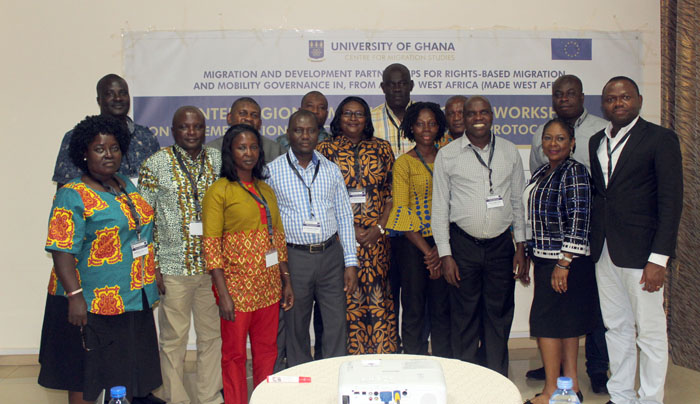The Participants in a group photo
Dr. Tony Luka Elumelu, Head of ECOWAS Division on Free Movement and Migration, has called for Member States to ensure proper implementation of laws that upholds the rights of migrants.
According to him, the unrestricted movement of persons, goods and services in the region would foster integration and economic development.
Dr. Elumelu said records have showed that Africans are very receptive but indicated that the full implementation of ECOWAS Free Movement protocol for example has been a challenge.
He said Ghana’s national identity card which can be used across the region and other policies like the 24 hours opening of the country’s border with Togo were commendable steps being taken by government to foster free movement among community citizens.
He thus called on other state members to take the best models and institutionalized them.
Dr. Elumelu was speaking with media personnel on the sidelines of a two-day Inter-Regional Multi-Stakeholders’ Workshop on ECOWAS Free Movement Protocol in Ghana.
The workshop was to help stakeholders identify solutions to the bottlenecks in the implementation of the free movement protocol under the Migration and Development West Africa (MADE) Project.
MADE Project
The MADE West Africa project being undertaken by the University of Ghana Centre for Migration Studies aims to promote good governance of migration, mobility and protection of migrants’ rights in the ECOWAS region.
The three-year project financed by the European Union in collaboration with the International Catholic Migration Commission was to see how migration could be used to enhance development in West Africa Region.
Professor Mariama Awumbila, Coordinator of the MADE West Africa Project, said it was developed around three key areas including how to facilitate free movement of people within the West Africa Region so that it could be used for development; enhancing the role of diaspora in West Africa’s development, and the protection of migrants’ rights.
“ECOWAS in recognition of this, developed some protocols and policies to enhance free movement of persons and services, thus, creating a borderless West Africa region so that all people living there would become community citizens,” she added.
She said CMS’ part in the programme was focused more on the enhancement of free movement protocol as a tool for West Africa’s development adding that about 84 per cent of migrants move within West Africa region.
Prof Awumbila said the 84 per cent was a huge resource which when properly leveraged could be used for West Africa’s development.
“We are to look at the protocol and problems associated with implementation of the protocol and what can be done to reduce some of these challenges and gaps so that it can be used for development purposes,” she added.
Prof Awumbila said “the research identified a lot of good things on the protocol; it as well identified quite a number of challenges and gaps in the implementation of the policy”.
Low knowledge of the protocol especially on the part of the populace and border officials, harassment at the boarders, lack of harmonized laws and inadequate resources were some of the gaps identified in the protocol.
Prof Teye said people who argued that migrants are taking over their businesses, are only looking at one side of the coin because migrants are also creating jobs and reducing unemployment.
Professor Joseph Kofi Teye, Director of CMS and member of the research team, said free movement of people leads to transfer of skills, it widen the market and thereby contributing to remittance.
He said in 2015 alone remittances accounted for 4.9 billion dollars and if mobility of persons and services are not encouraged, it would affect flow of remittances and transfer of skills.
He said free mobility also leads to migrants’ led-investment and thereby reducing unemployment.
An 8000 Euro Seed Fund component of the project will be launched early next month for Civil Society Organisations to develop action plans on free movement protocol.
The action plan is expected to run for six months with the results to be presented at next year’s Global Forum on Migration and development.
By Jamila Akweley Okertchiri


